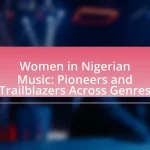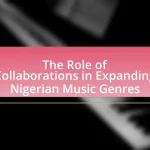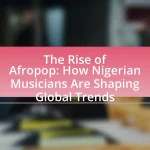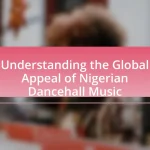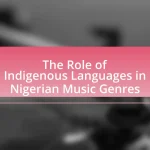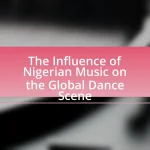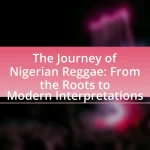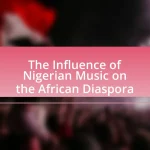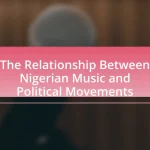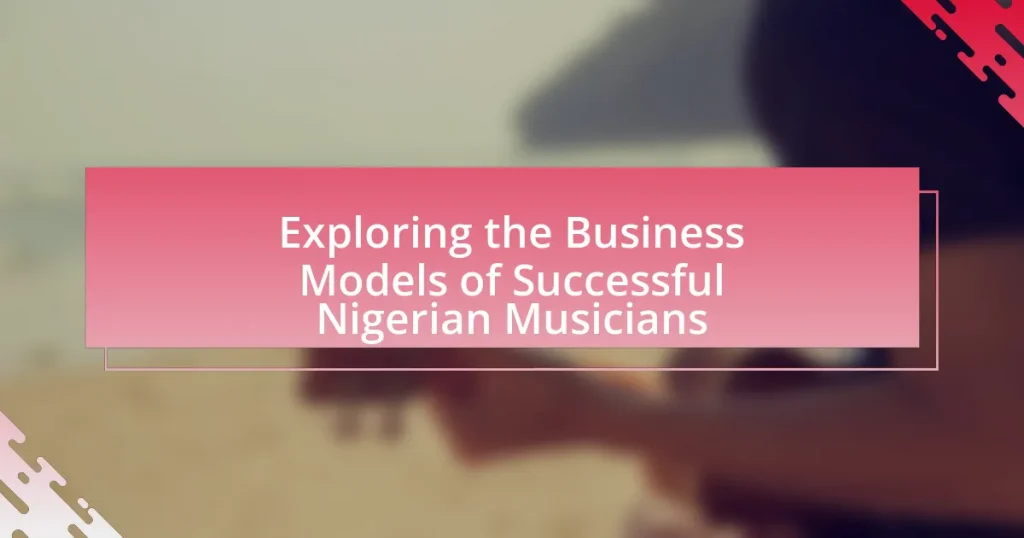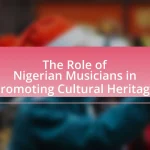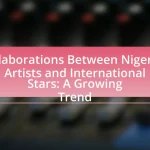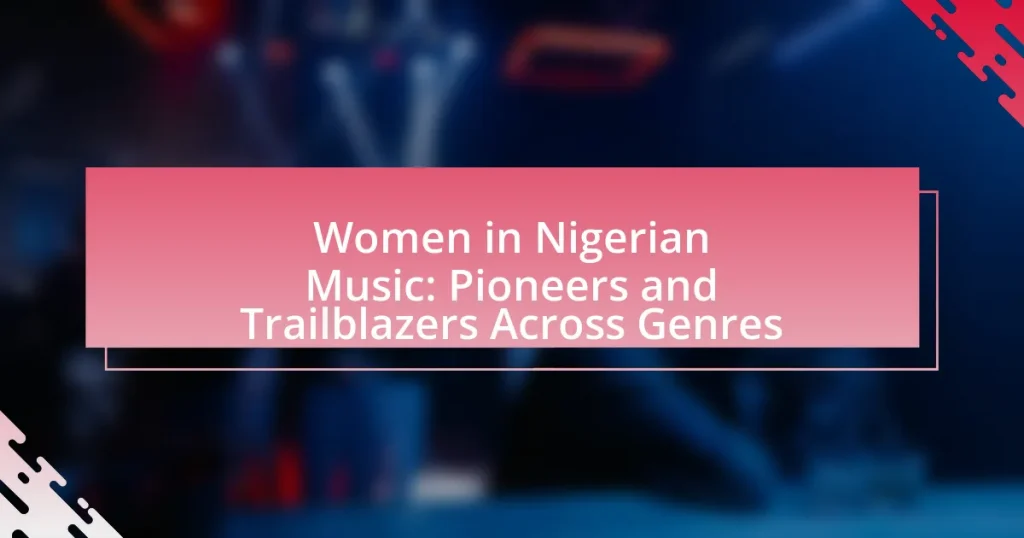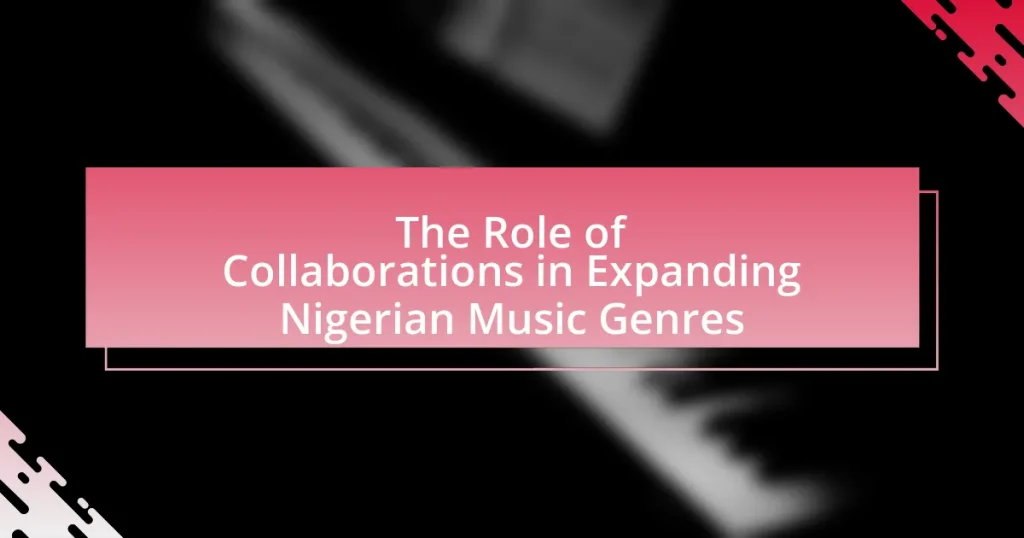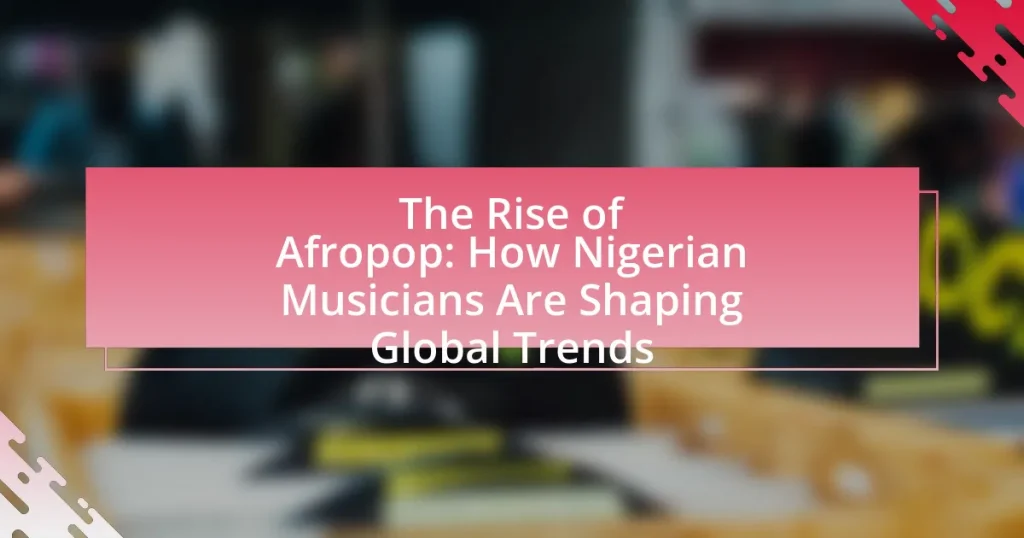The article explores the business models of successful Nigerian musicians, highlighting three primary revenue streams: music sales, live performances, and brand partnerships. It examines how these models differ from those in other countries, emphasizing the unique cultural factors and local market conditions that shape them. Additionally, the article discusses the impact of technology and digital platforms on music distribution, marketing, and fan engagement, while providing insights into the strategies successful artists use to build their brands and navigate challenges in the digital age. Emerging artists can learn valuable lessons from these practices to establish sustainable careers in the music industry.
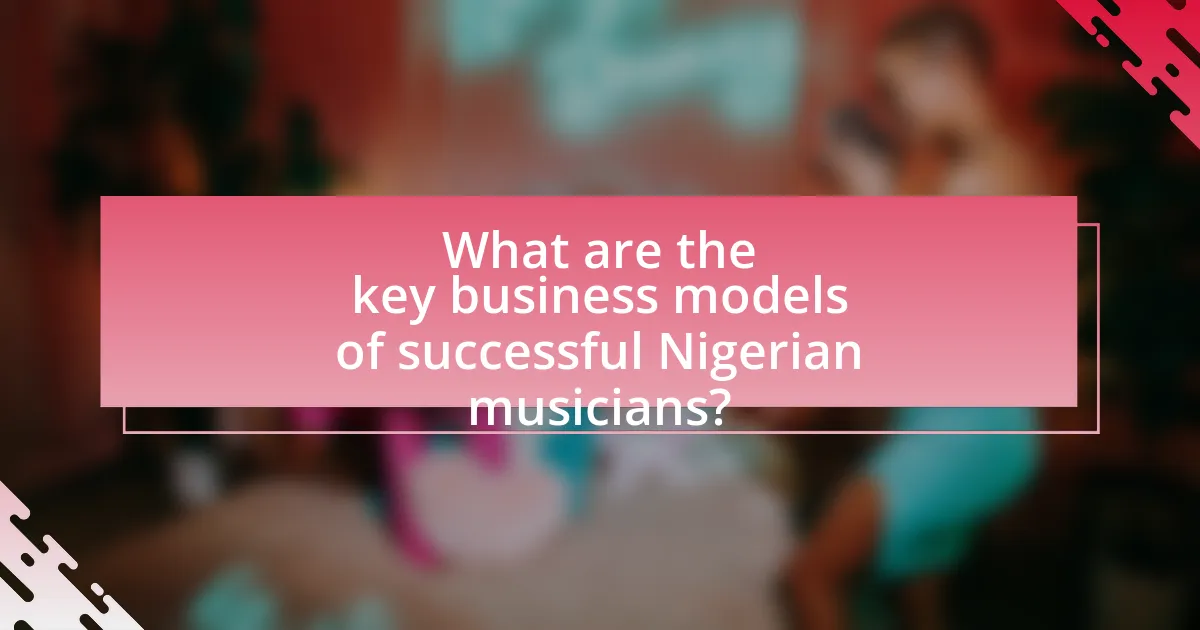
What are the key business models of successful Nigerian musicians?
Successful Nigerian musicians primarily utilize three key business models: music sales, live performances, and brand partnerships. Music sales, including digital downloads and streaming, generate significant revenue; for instance, platforms like Spotify and Apple Music have become crucial for artists to monetize their work. Live performances, such as concerts and festivals, provide substantial income, with events like the Lagos Jazz Series attracting thousands and generating millions in ticket sales. Brand partnerships, including endorsements and collaborations with companies, enhance visibility and profitability; artists like Wizkid and Burna Boy have secured lucrative deals with global brands, further solidifying their financial success.
How do these business models differ from those in other countries?
Nigerian musicians’ business models differ from those in other countries primarily due to their reliance on diverse revenue streams, including live performances, brand endorsements, and digital streaming. In Nigeria, the music industry has adapted to local market conditions, where live shows are a significant source of income, often surpassing recorded music sales, unlike in many Western countries where album sales and streaming royalties dominate. Additionally, Nigerian artists frequently engage in strategic partnerships with brands for endorsements, leveraging their cultural influence, which is less common in markets where artists may focus more on individual sales and streaming metrics. This unique approach is supported by the rapid growth of digital platforms in Nigeria, which has enabled artists to reach wider audiences and monetize their work effectively, contrasting with the more traditional models seen in other regions.
What unique cultural factors influence these business models?
Unique cultural factors influencing the business models of successful Nigerian musicians include the rich tradition of storytelling, communal values, and the significance of music in social events. Storytelling is integral to Nigerian culture, allowing musicians to connect with audiences through relatable narratives, which enhances their marketability. Communal values foster collaboration among artists, leading to joint ventures and collective performances that amplify reach and revenue. Additionally, music plays a crucial role in ceremonies and celebrations, creating consistent demand for live performances and recordings, thereby establishing a sustainable income stream for musicians. These cultural elements collectively shape the strategies and success of Nigerian musicians in the industry.
How do local market conditions shape these business models?
Local market conditions significantly shape the business models of successful Nigerian musicians by influencing their revenue streams, audience engagement, and distribution strategies. For instance, the prevalence of digital streaming platforms in Nigeria has led musicians to adopt models that prioritize online sales and streaming over traditional album sales, reflecting the growing internet penetration and mobile usage in the country. Additionally, local cultural preferences and trends dictate the types of music that gain popularity, prompting artists to tailor their content to resonate with their audience. According to a report by the International Federation of the Phonographic Industry, Nigeria’s music market grew by 25% in 2020, largely driven by local consumption patterns and the rise of social media as a promotional tool. This demonstrates how local market dynamics directly impact the strategies musicians employ to succeed.
What are the primary revenue streams for Nigerian musicians?
The primary revenue streams for Nigerian musicians include music sales, live performances, endorsements, and streaming royalties. Music sales generate income through physical and digital album purchases, while live performances provide significant earnings from concerts and events. Endorsements from brands and companies also contribute substantially to their income, as musicians often partner with businesses for promotional campaigns. Additionally, streaming royalties from platforms like Spotify and Apple Music have become increasingly important, reflecting the global shift towards digital consumption of music. These revenue streams collectively support the financial sustainability of Nigerian musicians in a competitive industry.
How do live performances contribute to a musician’s income?
Live performances significantly contribute to a musician’s income by generating direct revenue through ticket sales, merchandise, and performance fees. For instance, a successful Nigerian musician can earn substantial amounts from concerts, with ticket prices often ranging from 5,000 to 50,000 Naira, depending on the artist’s popularity and venue size. Additionally, merchandise sales during these events can further enhance earnings, with some artists reporting up to 30% of their concert revenue coming from merchandise. Furthermore, live performances can lead to increased streaming and sales of recorded music, as audience engagement often translates to higher demand for an artist’s discography. This multifaceted income stream underscores the importance of live performances in the overall financial success of musicians.
What role does music streaming play in revenue generation?
Music streaming plays a crucial role in revenue generation for artists and the music industry by providing a platform for widespread distribution and access to music. Streaming services like Spotify, Apple Music, and others have transformed how music is consumed, allowing artists to earn royalties based on the number of streams their songs receive. In 2022, the global music streaming market generated approximately $23 billion, highlighting its significance in overall music revenue. This model allows artists, including successful Nigerian musicians, to reach a global audience, thereby increasing their potential earnings through both direct streaming royalties and ancillary revenue streams such as merchandise sales and concert ticket sales linked to their online presence.
How do merchandise sales impact overall earnings?
Merchandise sales significantly enhance overall earnings for Nigerian musicians by providing an additional revenue stream beyond music sales and performances. This impact is evident as musicians leverage their brand and fan base to sell products such as clothing, accessories, and memorabilia, which can generate substantial profits. For instance, successful artists like Wizkid and Burna Boy have reported that merchandise sales contribute a notable percentage to their annual income, with some estimates suggesting that merchandise can account for up to 30% of total earnings during tours. This diversification of income not only stabilizes their financial situation but also strengthens their brand presence in the market.
What strategies do successful Nigerian musicians use to build their brands?
Successful Nigerian musicians build their brands through strategic collaborations, effective use of social media, and engaging live performances. Collaborations with both local and international artists enhance their visibility and credibility, as seen with artists like Wizkid and Burna Boy, who have partnered with global stars. Social media platforms, particularly Instagram and Twitter, are utilized to connect directly with fans, promote new releases, and share personal stories, which fosters a loyal fanbase. Additionally, live performances at major events and festivals not only showcase their talent but also create memorable experiences that strengthen their brand identity. These strategies collectively contribute to the musicians’ marketability and sustained relevance in the competitive music industry.
How important is social media presence for brand building?
Social media presence is crucial for brand building, particularly for Nigerian musicians. It enables artists to engage directly with their audience, fostering a sense of community and loyalty. According to a 2021 survey by Hootsuite, 54% of social media users utilize these platforms to research products and brands, highlighting the importance of visibility. Furthermore, successful Nigerian musicians like Burna Boy and Wizkid have leveraged platforms like Instagram and Twitter to enhance their brand identity, resulting in increased fan engagement and revenue streams. This demonstrates that a strong social media presence is not just beneficial but essential for effective brand building in the music industry.
What role do collaborations play in enhancing visibility?
Collaborations significantly enhance visibility for Nigerian musicians by expanding their audience reach and leveraging the fan bases of their partners. When artists collaborate, they tap into each other’s established networks, which can lead to increased exposure across different demographics and geographical locations. For instance, a collaboration between a well-known artist and an emerging talent can introduce the latter to a broader audience, as seen in the partnership between Wizkid and Tems, which propelled Tems into international recognition. This strategic alliance not only boosts individual visibility but also fosters cross-promotion, ultimately leading to greater market presence and potential revenue growth for both parties involved.

How do successful Nigerian musicians leverage technology in their business models?
Successful Nigerian musicians leverage technology by utilizing digital platforms for music distribution, marketing, and fan engagement. They distribute their music through streaming services like Spotify and Apple Music, which allows them to reach a global audience and generate revenue through royalties. Additionally, they use social media platforms such as Instagram and Twitter to promote their work, connect with fans, and build their brand presence. For instance, artists like Burna Boy and Wizkid have effectively used these platforms to enhance their visibility and engage with millions of followers, leading to increased ticket sales for concerts and merchandise. Furthermore, technology enables them to collaborate with international artists remotely, expanding their creative horizons and market reach. This strategic use of technology not only enhances their business models but also contributes to the growth of the Nigerian music industry on a global scale.
What digital platforms are most effective for music distribution?
The most effective digital platforms for music distribution include Spotify, Apple Music, and YouTube. These platforms dominate the global music streaming market, with Spotify boasting over 500 million users and Apple Music having over 88 million subscribers as of 2023. YouTube, with its vast reach, serves as a primary platform for music discovery, with over 2 billion logged-in monthly users. These platforms provide artists with significant exposure and revenue opportunities through streaming royalties and advertising.
How do musicians utilize social media for marketing and engagement?
Musicians utilize social media for marketing and engagement by creating direct connections with their audience, promoting their music, and building their brand presence. Platforms like Instagram, Twitter, and TikTok allow musicians to share content such as music videos, behind-the-scenes footage, and personal stories, fostering a sense of community and loyalty among fans. For instance, Nigerian artists like Burna Boy and Wizkid have effectively used social media to announce new releases, engage with fans through live sessions, and collaborate with other artists, which has significantly increased their visibility and reach. According to a 2021 report by the International Federation of the Phonographic Industry, 70% of music consumers engage with artists on social media, highlighting its importance in modern music marketing strategies.
What tools do musicians use for music production and promotion?
Musicians use digital audio workstations (DAWs) like Ableton Live, FL Studio, and Logic Pro for music production, while social media platforms such as Instagram, Facebook, and TikTok are essential for promotion. DAWs enable musicians to record, edit, and produce music efficiently, with features that support various genres and styles. Social media platforms allow musicians to reach wider audiences, engage with fans, and promote their work through targeted advertising and content sharing. According to a 2021 report by the International Federation of the Phonographic Industry, 70% of music discovery occurs through social media, highlighting its importance in promotion.
How has the rise of digital music changed the landscape for Nigerian musicians?
The rise of digital music has significantly transformed the landscape for Nigerian musicians by providing them with broader access to global audiences and new revenue streams. Digital platforms like Spotify, Apple Music, and YouTube have enabled Nigerian artists to distribute their music internationally without the need for traditional record labels, which historically controlled access to markets. For instance, in 2020, Nigerian music streaming revenue increased by 25%, reflecting the growing consumption of digital music. This shift has empowered artists to monetize their work directly through streaming, merchandise sales, and live performances, leading to increased financial independence and creative control. Additionally, social media platforms have facilitated direct engagement with fans, allowing musicians to build their brands and promote their music more effectively.
What challenges do musicians face in the digital age?
Musicians face several challenges in the digital age, including issues related to revenue generation, market saturation, and copyright infringement. The shift from physical sales to digital streaming has significantly reduced income for many artists, as platforms like Spotify and Apple Music pay only a fraction of a cent per stream. Additionally, the ease of access to music online has led to an oversaturated market, making it difficult for individual musicians to stand out and gain visibility. Furthermore, copyright infringement remains a persistent issue, with unauthorized distribution of music undermining artists’ rights and potential earnings. These challenges highlight the complexities musicians navigate in adapting to a rapidly evolving digital landscape.
How do musicians adapt to changing consumer behaviors?
Musicians adapt to changing consumer behaviors by leveraging digital platforms and engaging directly with their audience. For instance, many Nigerian musicians utilize social media and streaming services to distribute their music, allowing them to reach a broader audience and respond to consumer preferences in real-time. According to a report by the International Federation of the Phonographic Industry, digital music revenues in Nigeria grew by 25% in 2020, highlighting the shift in consumer behavior towards online consumption. Additionally, musicians often collaborate with brands and influencers to enhance their visibility and connect with fans, demonstrating their ability to pivot in response to market trends.
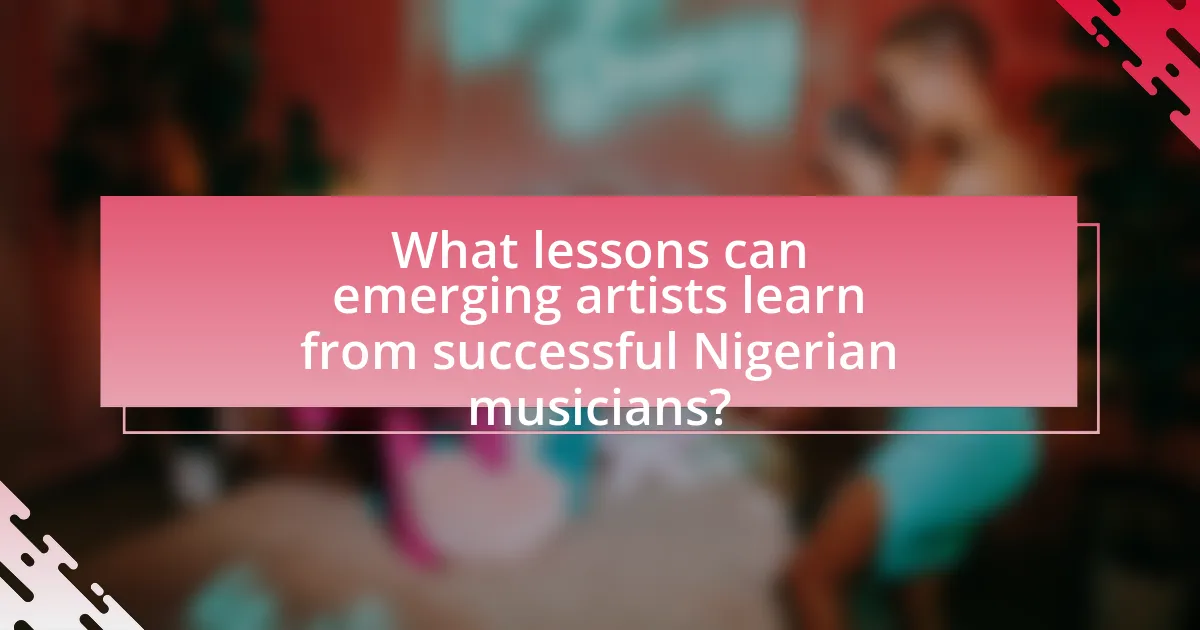
What lessons can emerging artists learn from successful Nigerian musicians?
Emerging artists can learn the importance of diverse revenue streams from successful Nigerian musicians. Many prominent Nigerian artists, such as Burna Boy and Wizkid, have built their careers by not only focusing on music sales but also engaging in brand partnerships, merchandise sales, and live performances. For instance, Burna Boy’s collaboration with major brands like Nike demonstrates how strategic partnerships can enhance visibility and income. Additionally, successful Nigerian musicians often leverage social media platforms to connect with fans and promote their work, which is crucial for building a loyal audience. This multifaceted approach to income generation and fan engagement is a key lesson for emerging artists aiming to establish sustainable careers in the music industry.
What best practices should new musicians adopt for success?
New musicians should adopt a multifaceted approach that includes building a strong online presence, networking within the industry, and continuously honing their craft. Establishing a robust online presence through social media platforms and music streaming services allows musicians to reach a wider audience, as evidenced by the fact that over 70% of music discovery now occurs online. Networking with other artists, producers, and industry professionals can lead to collaborations and opportunities, which are crucial for growth in a competitive market. Additionally, dedicating time to practice and improve musical skills ensures that musicians can deliver high-quality performances, which is essential for gaining and retaining fans.
How can emerging artists effectively network within the industry?
Emerging artists can effectively network within the industry by actively participating in music events, collaborating with other artists, and utilizing social media platforms. Engaging in local music festivals and open mic nights allows artists to meet industry professionals and fellow musicians, fostering valuable connections. Collaborations with established artists can enhance visibility and credibility, as seen in the Nigerian music scene where artists like Burna Boy and Wizkid often collaborate with up-and-coming talent. Additionally, leveraging social media platforms such as Instagram and Twitter enables artists to showcase their work, interact with fans, and connect with industry influencers, which is crucial for building a professional network.
What financial management tips are crucial for new musicians?
New musicians should prioritize budgeting, tracking expenses, and understanding revenue streams to manage their finances effectively. Establishing a budget helps musicians allocate funds for recording, marketing, and living expenses, ensuring they do not overspend. Tracking expenses allows musicians to identify areas where they can cut costs, which is crucial in an industry where income can be unpredictable. Additionally, understanding revenue streams, such as streaming royalties, live performances, and merchandise sales, enables musicians to diversify their income and make informed financial decisions. According to a report by the Music Industry Research Association, musicians who actively manage their finances are more likely to sustain their careers in the long term.
What common pitfalls should new musicians avoid?
New musicians should avoid the common pitfalls of neglecting marketing, underestimating the importance of networking, and failing to manage finances effectively. Neglecting marketing can lead to a lack of audience engagement; for instance, many successful Nigerian musicians utilize social media platforms to promote their work, which is essential for visibility. Underestimating networking can result in missed opportunities for collaborations and performances, as building relationships within the industry is crucial for growth. Lastly, failing to manage finances can lead to unsustainable practices; research shows that many artists struggle financially due to poor budgeting and lack of financial literacy, emphasizing the need for new musicians to prioritize financial education.
How can artists protect their intellectual property?
Artists can protect their intellectual property by registering their works with copyright offices, which grants them exclusive rights to reproduce, distribute, and display their creations. Copyright registration provides legal proof of ownership and enables artists to take legal action against unauthorized use. In Nigeria, the Copyright Act of 1988 protects original works, including music, art, and literature, ensuring that artists can enforce their rights. Additionally, artists can use contracts to define usage rights and royalties, further safeguarding their intellectual property.
What mistakes do musicians often make in their business strategies?
Musicians often make the mistake of neglecting proper financial management in their business strategies. This oversight can lead to cash flow issues, as many musicians fail to budget effectively or track their expenses and income. According to a survey by the Music Industry Research Association, 70% of musicians reported financial difficulties due to poor financial planning. Additionally, musicians frequently underestimate the importance of marketing and branding, which can hinder their ability to reach wider audiences and generate revenue. A lack of understanding of the digital landscape, including social media and streaming platforms, further exacerbates these issues, as musicians miss opportunities to engage with fans and monetize their work effectively.
